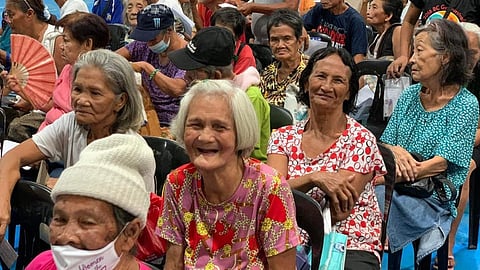
- NEWS
- the EDIT
- COMMENTARY
- BUSINESS
- LIFE
- SHOW
- ACTION
- GLOBAL GOALS
- SNAPS
- DYARYO TIRADA
- MORE

The University of the Philippines (UP) Manila and the National Commission of Senior Citizens (NCSC) inked a memorandum of agreement (MOA) to develop transformative programs and academic curricula aimed at promoting the healthy and dignified care of Filipino senior citizens.
Key initiatives under the partnership include integrating eldercare into the National Service Training Program (NSTP) curriculum to institutionalize elderly care, cultivate empathy, and foster awareness among the youth; developing micro-credential training programs for barangay health workers and caregivers; and designing emergency preparedness programs for Senior Citizens Community Care Centers (SC3Cs).
Additionally, the partnership entails engaging the services of retired faculty from state universities and colleges and empowering them to continue sharing their expertise and passion through community service, mentoring, and research initiatives on healthy aging, evidence-based policy support, and promotion of community programs enhancing senior mobility, mental health, and well-being.
UP Manila Chancellor Michael Tee welcomed the partnership with the NCSC and stressed its goal to redefine Filipino elder care.
“Through this initiative, we aim to develop policies and systems that promote dignified aging, while also teaching the next generation to view eldercare not just as a responsibility, but as a privilege,” Tee stressed.
"With UP Manila’s leadership in education, research, and service, we will be a strong partner in building a society where aging is truly celebrated,” he added.
In 2020, the Philippine Statistics Authority recorded over 9.2 million Filipinos aged 60 and above, accounting for more than 8.5 percent of the population. This figure is projected to increase to about 13 million by 2030.
UP Manila will lead in the program design, stakeholder consultations, training, research, and field exposure for its faculty and students. Meanwhile, the NCSC will facilitate the implementation of the programs, provide policy guidance and funding support, and ensure alignment with national policies concerning senior citizens.
Meanwhile, Dr. Shelley Dela Vega, director of the Institute of Aging at the National Institutes of Health, hailed the shared vision of both institutions in helping senior citizens in a healthy and productive way.
Vega underscored that the landmark agreement between UP Manila and the NCSC "reflects our shared vision and goals towards the healthy and productive aging of senior citizens in the Philippines."
With the MOA, Vega added that it is anticipated that there will be more research and service programs that will address the community health and systems needs of frail and retired senior citizens.
"Another common goal is to prepare the Philippines for long-term care in homes, communities, and institutions. We will continue to work together to enable re-employment and meaningful work for seniors who are ready to enter the workforce in various industries," she added.
"We will continue to develop learning modules for professional and community workers on caring for older people and ways to achieve healthy aging."
